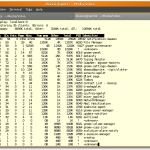This is a comment I left on Philip’s blog in response to Ross’ blog.
question: what are we, third graders that we must do all this touchy-feely, “we must not make comments†stuff?
ross’ comment was a bit on the edge, but its his blog, and he has any rights to write that the player sucks; the other blog post from joe is the more relevant: the entire free software/open source thingie works because we have copyright and because we have peer pressure. the “author†of listen stole code, because it didn’t simply lift it and put it into his project: he also removed the copyright notices. I copy code from many projects (as far as the license enables me to do it safely) but I leave at least a note saying from where I took the code and who’s the author. if a big company did the same thing we would all be jumping and screaming around.
what strikes me the most is that, instead of integrating stuff by talking to the various projects and – at most – forking some code base, the guy just went lifting code, collating stuff like a frankenstein movie, and then releasing the resulting “monster†without even a mention of the other projects. and all these people say: “oh, the media player situation demands it†or: “oh, amarok is such a fine player that we need a poor man’s clone for gnome†– basically insulting every author of the other media players around, insulting an author that want his contribution to the f/oss community recognized as he well should, and justifying the copyright infringement for the sake of having their pretty little clone.
these are energy stoppers. If I was a developer of another media player I would simply cease all my work instantly, out of such blatant ingratitude.
After having read some of the comments on Ross’ blog, and after the querelle about the NLD10 stuff that happened on the desktop-devel-list, I’m wondering if the major problem of the Gnome community is its being made of third graders, where one must not say bad things about someone else’s work because of a “we are all special”-kinda-like agreement that, it seems, you implicitly sign when you get an account.
Come on! If I think that a projects sucks I’ll write that it sucks, ferchrissake! I expect none the less from my peers, and I expect none the less from the many people that is well above my skills. If I wrote a piece of software and someone comes along saying that it sucks because of this and that, then I’ll respond or I’ll say fuck dude, you are right and will change it, or I’ll say yep, but it’s my project and I will go on. Gracefully taking criticism for your work is a valuable indicator that you are not a child anymore.
If you cannot cope with this, then please don’t even begin coding; because peer pressure and peer review are what makes F/OSS such a great endeavour.

